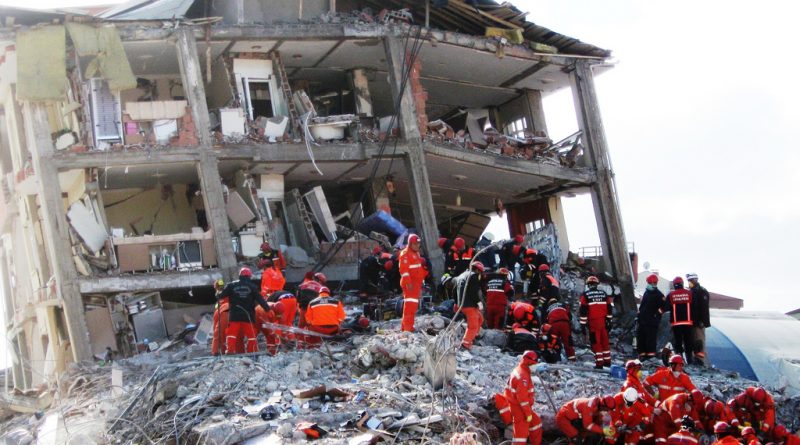Türkiye’s Response to Natural Disaster Will Determine the Nation’s Political Future
Andrea Gonzalez
Digital Editor
During the early hours of February 6, a 7.8 magnitude earthquake shook Türkiye and neighboring countries, including Syria and Lebanon. Hours later, a magnitude 7.5 aftershock decimated more buildings. As of February 10, more than 20,200 people died in Türkiye, says The New York Times, making it one of the worst natural disasters to hit the region in the last decade.
Türkiye was not prepared for the tremors, though it should have been, given its geographical location between two fault lines. More than 6,000 buildings collapsed in areas the government worked to reinforce during the Turkish earthquake-proofing construction movement from 2008 through 2013. Although humanitarian aid and rescue efforts are pouring in from around the world, the tragedy further compromises Türkiye’s economic agenda and political efficiency. It raises the question of who is responsible for such devastation.
Prominent political figures and Turkish citizens are looking at President Recep Tayyip Erdogan, and his Justice and Development Party (AKP) for their role in failing to provide a quicker response to the disaster, which they initially deemed was under control. In the first hours of the disaster, opposition leaders from Ankara and Istanbul deployed aid and criticized Erdogan’s slow and disjointed response, according to CNBC. Since then, Erdogan has issued a state of emergency that will last three months in the ten provinces to provide victims with 10,000 Turkish Lira ($531), relocation services, mobilization of all national forces, and a promise to rebuild all affected homes in one year.
Before the earthquake, Türkiye was already struggling with inflation, monetary policy, military, and political turmoil, taking back two decades of economic growth as the consumer price index spiked an average of 10 percent every month in 2022, according to CNBC. 2023 is expected to be crucial as Türkiye approaches a presidential election on May 14- now determining whether President Erdogan will continue to lead reconstruction and the nation’s political future. The election will likely become a referendum on his effectiveness and legitimacy as a leader, especially as millions of people in the Middle Eastern country suffer amid subfreezing temperatures. The election will also provide Turks with the opportunity to judge the rescue effort and the extent to which modern “earthquake proofing” codes were implemented.
In addition, Türkiye’s hyper-declining economic path before the catastrophe is attributed to the President’s unorthodox economics. To battle crippling inflation, Erdogan pressured the Central Bank of Türkiye to keep borrowing rates low as he increased wages by 55 percent to bolster economic activity; this approach continues to fail as he faces severe criticism from Turkish economists and investors.
Though no country can be expected to solve such economic and environmental crises without shortcomings, strict building regulations paper did not protect those still under the rubble, and neither did taxpayer money supposedly dedicated to such infrastructure projects. The scale of destruction is such that seismologists say that urban planning and building codes are still woefully inadequate, according to Al Jazeera. Moreover, though homeowners have been paying earthquake-proofing taxes since the early 2000s, which is somewhere in the billions of US dollars, Erdogan’s government has not been clear about where the money was spent, according to German-Arabic news outlet Qantara. The situation raises more questions about Türkiye’s censorship of the government’s spending reports in the last ten years. Worse still, these questions may go unanswered, as under Türkiye’s current political climate, investigative journalism is under threat. The government can be expected to launch campaigns to absolve itself of responsibility and blame contractors instead.
Currently, Erdogan’s priorities are likely to minimize negative political implications and contain the possible fallout, says Middle East Institute, which may result in using aid and rescue efforts as a launchpad for reelection. The President has been in the affected provinces meeting with survivors and assessing the damage. At the same time, deployed rescue teams face setbacks due to winter conditions, rubble blocking the road, and the possibility of further tremors in the region.
As the humanitarian crisis builds, experts say aftershocks will continue to compromise infrastructure throughout the country. Losing more buildings will also slow rescue efforts to find survivors and remains under the rubble. Anger is building among families that expect nothing less than hardship in the coming years. Meanwhile, Erdogan’s economic policies impede efforts to reduce inflation, and the Turkish Lira is expected to keep falling against the dollar. One of the largest economies in the world now faces one of the worst economic and humanitarian crises of the century and has little time to turn the tide.
Image courtesy of EU Civil Protection and Humanitarian Aid

